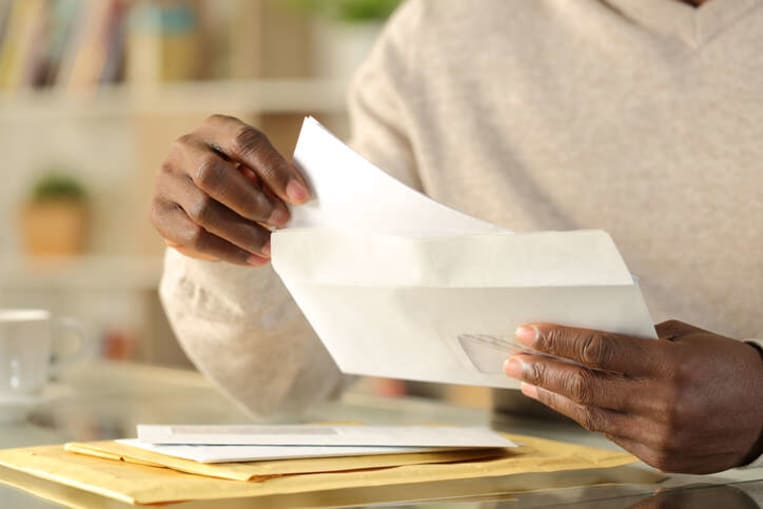
BBB Tip: Mail delays? How to get your bills paid

(Getty Images)
Have you gotten a bill in the mail after its due date? Or maybe you mailed in a check, only to have it arrive late? If so, you’re not alone.
The United States Postal Service and Canada Post have both experienced mail delays from time to time. With more people shopping online, it's inevitable that delays will happen, which can cause problems for people who pay their bills by mail.
Worried about a missed payment? Here are your options
- Reach out directly to the company. Find the phone number on an old invoice, and call the company or utility to explain the situation. If you haven’t received your bill, they can give you your balance and have you pay over the phone. If you have mailed your bill, they can advise you on the best way to avoid late fees. Always be careful when dialing customer service numbers because scammers purchase similar phone numbers.
- Go online. Log in to your online account and pay there. Be sure that you are on a secure site (Look for HTTPS:// or the lock icon), and that you’ve typed the address correctly. Double-check the URL before entering any information. Scammers often use lookalike website domains.
- Ask your bank. If you’ve mailed a check that hasn’t arrived in time, ask your bank if they will waive the stop payment fee so that you can pay over the phone or online. Then, call the company
Setting up online payments
Avoid future issues with late bills by switching to online payments. Paying online can help you keep your accounts organized and minimize unnecessary fees. Here's how to get started:
- Know your options: There are two ways you can pay bills online: you can pay companies individually through their mobile apps or websites, or you can set up automated bill pay with your bank or credit union by authorizing them to make payments on a specific day each month. You can use one or both methods, depending on your preferences.
- Set up individual payments. To make payments directly to a company, make sure you are on the official website and then set up a username and password. Most companies ask for your email address and phone number to confirm your identity. Next, link your payment method, such as your credit card or bank account information. You may need to provide your bank’s routing number, which you can find on your paper checks.
- Set up online bill pay with your bank. Create an online account on your bank’s official website or app. Log in and choose the “bill pay” option. Next, add the information for each company you want to pay online, including the company name, address, and your account number with them. Specify the amount you want to pay each month, which account the payment should be withdrawn from, and the date the payment should be processed.
- Automate your payments. Set up recurring payments, and you won’t have to worry about forgetting a payment again. Keep in mind, if you are using online bill pay through your bank, they may take a day or two to process payments, so schedule them a few days before the due date.
- Keep an eye on your bills. Check your accounts regularly with each company to make sure you haven’t missed any rate increases. Consumerfinance.gov reminds consumers, “If you have set up recurring payments and the amount changes, you may pay the wrong amount. If you pay less than the full amount of the bill, you may have to pay fees.” Also, be sure to check your credit card statements for any errors or fraudulent charges.
- Review your bank account regularly. Automated bill pay won’t work if you don’t have sufficient funds in your accounts to cover the bill, which could result in late fees or overdraft fees.
- Keep copies of your monthly statements. Instead of just looking at statements and notices online, ConsumerReports.org recommends downloading copies of your statements and notices to your computer for safekeeping and future reference.
- Guard your personal information. AARP reminds consumers that online banking is generally safe, as long as you choose strong passwords and safeguard your data. This means not sharing personal information in response to an unsolicited email or phone call – even if it appears to come from a company or bank you do business with.
- Use a secure network. Only access your bill pay accounts on a secure network, like your private home Wi-Fi network. Public Wi-Fi networks may lack important security protections. Be sure you have an up-to-date antivirus program running on your computer before you enter your personal information on a website as well.
For more information:
Get BBB's tips for creating strong passwords. As tax season approaches, you may want to consider filing your return online to avoid delays with the mail system. BBB has tips to help you file taxes online safely.
The US Postal Service implemented several steps to address missing mail issues and recommends checking the service alerts page on usps.com for the most recent major service disruptions.
Still Need Assistance?
Contact Your Local BBB
Your local Better Business Bureau can assist you with finding businesses you can trust. Start With Trust®.
Additional Resources
Let BBB help you resolve problems with a business
Research and report on scams and fraud using BBB Scam Tracker
Learn more about the value of BBB Accreditation